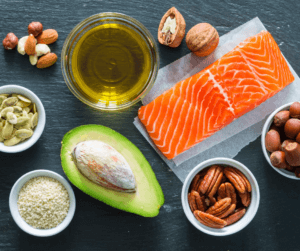One of the main components of wellness is nutrition. It’s well-known that what you put inside your body directly affects how you will feel physically and mentally. So if you’re eating a balanced diet full of fresh veggies and fruits, you’re likely to feel your best. On the other hand, diets high in sugars and unhealthy fats can make you feel drained, agitated, and bloated.
Keep reading to learn how nutrition truly makes a difference in your wellbeing and wellness journey.
1. Indulge in fruits and vegetables.
It’s summertime and that means fresh produce can be found at local grocery stores and farmers’ markets. Fruits and veggies are an essential key to having a healthy diet. Dark, leafy greens, oranges, and tomatoes — even fresh herbs — are loaded with vitamins, fiber, and minerals. And because vegetables are so easy to cook, steam, bake, etc. you can practically and simply toss them in a variety of dinner meals.
farmers’ markets. Fruits and veggies are an essential key to having a healthy diet. Dark, leafy greens, oranges, and tomatoes — even fresh herbs — are loaded with vitamins, fiber, and minerals. And because vegetables are so easy to cook, steam, bake, etc. you can practically and simply toss them in a variety of dinner meals.
Fresh fruits are a great way to keep the sweet tooth happy but still maintain a healthy diet. Opt for fresh fruits in season or frozen or dried fruits as opposed to fruits soaked in fructose sugar.
2. Limit/avoid certain foods.
There are a number of foods that you should try to limit or avoid completely to promote wellness. Highly processed foods and refined grains can make you feel dragged down and offer no real health benefit. Also, avoid added sugar. Limit your alcohol intake and foods that have trans fats listed in the ingredients.
 3. Try different ‘lean meat’ options.
3. Try different ‘lean meat’ options.
Preparation matter, whether fried or baked make sure that your protein source is not cooked in oil, which can be loaded with additional calories. Opt for other ways to make a meal heartier and filling — grilling and broiling are great options. Be sure to choose a lean and/or skinless cut of meat for healthier options.
4. Watch fat and oil intake.
Fat is essential for energy and cell health, but too much fat can increase calories above  what the body needs and may lead to weight gain and other health concerns. A moderate amount of fat should remain in the diet — about 35 percent or less of calories.
what the body needs and may lead to weight gain and other health concerns. A moderate amount of fat should remain in the diet — about 35 percent or less of calories.
Try to remember:
- Fats to love: coconut, olive, and avocado oils
- Fats to lose: saturated and trans fats, used in many processed and premade foods, such as donuts
It may be difficult to adjust to a new diet, but just remember, the outcome of well-balanced nutrition is feeling your best and knowing you have wellness on your side. Remember to tackle one small habit at a time, then build on that.